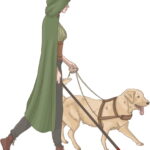Blindness

Your vision is impaired to the point that it can’t be corrected or is absent completely (IE 4), and you have learned to navigate the world with little or no reliance on your eyes, depending on other senses instead.
We highly recommend this article for more on blind characters in RPGs.
Because you have grown accustomed to this condition a long time, if you can explain to your GM how you’re using your other senses to assist with your Blindness, you have a −(IE) on sight-related attack rolls, ability checks, and saving throws including ranged combat beyond 10 ft. but a +(IE) bonus when using other senses to compensate, not because they’ve become stronger, but because you’ve learned to use them more effectively. In addition:
You do not have disadvantage to hit invisible creatures.
You are proficient in the use of a stylus for reading and writing. If you have a spellbook, you can copy spells into your spellbook by pressing a stylus into its parchment pages. This method inscribes your spells for easy reading in your own personal texture code. (Since a metal stylus is a hand tool for writing, it can be crafted by any smith for a cost of 2 sp.)
If you’re only blind in one eye, the penalty only applies to that side.
Real-world Examples
Retinitis Pigmentosa, Macular Degeneration, Diabetic Retinopathy, Glaucoma
Assistive Options
Canes, quarterstaffs, and walking sticks help determine surroundings, reducing the IE penalty by 1, and trained animals can also assist, but mostly, you depend on your other senses to assist with your blindness, using those senses to gather similar information about the environment that a seeing person would.
Magical Assistance
Spells and other effects that allow the caster to perceive visual information through another source than the eyes can temporarily assist with this disability and remove the penalty, although due to the difference in perspective direction, your proficiency bonus on physical ability checks is halved, rounding down, if precise movement is necessary, to be discussed between the player and GM. Detection spells allow you to sense the detected item or creature as a feeling of location without seeing the object itself or its surroundings, experienced by other senses as an echo, a tug, a temperature change, or even an aroma.